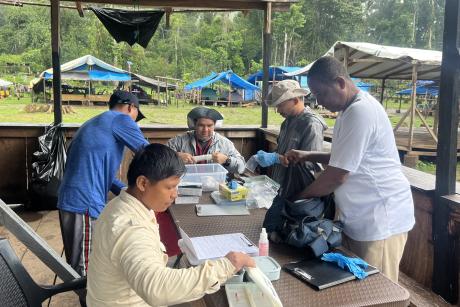
Worldwide, an estimated three billion people use “dirty fuels” to cook, and more than one billion people live without electricity. Photo by DDC International.
Published January 29, 2018 under Research News
Duke University is launching a project focused on developing new and collaborative ways to meet the energy needs of some of the world’s most disadvantaged communities.
The Energy Access Project was established by a $1.5 million gift from Jim Rogers, former CEO and chairman of the board for the electric utility company Duke Energy, and his wife, M.A. Rogers. The Bass Connections Challenge at Duke University will add $750,000 in matching funds for a total of $2.25 million to support the project’s goal of accelerating deployment of sustainable energy and empowering the world through expanded energy access.
Public policy and global health professor Subhrendu Pattanayak will serve as the project’s faculty director. In this role, he will continue to build the research network initiated with funding from the Duke Global Health Institute, the Office of the Provost and the Environment for Development (EfD) Initiative. He will also lead the project’s educational initiatives. Pattanayak’s involvement in this project illustrates the close connection between energy and health.
Worldwide, an estimated three billion people use “dirty fuels” to cook, and more than one billion people live without electricity. Another one billion have limited access because of unreliable grids. These populations are concentrated mostly in South Asia (e.g., India) and sub-Saharan Africa.
The lack of modern energy sources has far-reaching implications for global health because of the high levels of air pollution caused by burning biomass fuels, which can lead to cardiovascular and respiratory disease. Lack of electricity also impacts climate change, the time burden on women and economic opportunity.
Jonathan Phillips, formerly the senior adviser to the president and CEO of the Overseas Private Investment Corporation (OPIC) from 2016 to 2017, will lead the project’s applied work and engagement from Duke’s Nicholas Institute for Environmental Policy Solutions.
Learn more about this project.
The lack of modern energy sources has far-reaching implications for global health because of the high levels of air pollution caused by burning biomass fuels, which can lead to cardiovascular and respiratory disease.

